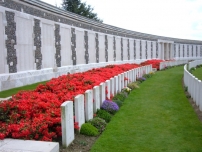| First Name: | William Henry | Last Name: | WEEKS | |
|---|---|---|---|---|
| Date of Death: | 23/08/1917 | Lived/Born In: | Euston | |
| Rank: | Private | Unit: | Cornwall Light Infantry6 | |
| Memorial Site: | Tyne Cot Memorial, Belgium | |||
Current Information:Age-27 Born-St Pancras
Third Battle of Ypres This was a campaign fought between July and November 1917 and is often referred to as the Battle of Passchendaele, a village to the north-east of Ypres which was finally captured in November. It was an attempt by the British to break out of the Ypres salient and capture the higher ground to the south and the east, from which the enemy had been able to dominate the salient. It began well but two important factors weighed against them. First was the weather. The summer of 1917 turned out to be one of the wettest on record and soon the battlefield was reduced to a morass of mud which made progress very difficult, if not impossible in places. The second was the defensive arrangements of concrete blockhouses and machine gun posts providing inter-locking fire that the Germans had constructed and which were extremely difficult and costly to counter. For four months this epic struggle continued by the end of which the salient had been greatly expanded in size but the vital break out had not been achieved. 14th Division were undergoing training at the start of Third Ypres but on 14th August the 6th Cornwall Light Infantry battalion of 43 Brigade moved to Ypres where they were immediately were put to work carrying munitions forward to various locations including the front line. On 17th August the battalion moved to a camp at Dickebusch and three days later moved into the front line from the southern edge of Glencorse Wood on their left to the northern edge of Inverness Copse on their right. Just after dawn on 22nd August, 6th Cornwall and 6th Somerset Light Infantry attacked with Inverness Copse and Fitzclarence Farm as their objectives. The leading wave of 6th Cornwall was almost immediately held up by heavy machine gun fire from both flanks as a result of which they lost contact with protective artillery barrage and their advance came to a halt. A tank came forward and performed a valuable service by traversing along a well defended enemy trench and destroying a stronghold which allowed the advance to continue, but only briefly. More opposition and other strong points once again brought forward movement to an end and 6th Cornwall had no option but to dig in. On the following day, 23rd August, the attack was resumed, in conjunction with three tanks but this coincided with a strong counter-attack by the enemy causing forward movement to grind to a halt and the rest of the day was spent consolidating their position as best as possible. Enemy pressure continued throughout 24th August and as their new positions seemed to be untenable there was a withdrawal to the original starting line after which 6th Cornwall were relieved and moved back to Zillebeke. The battalion had suffered over 300 casualties during this operation one of whom was William Weeks who was killed on 23rd August. |
||||
| « Back to Search Results | ||||
| If you think any of the information shown here is incorrect, Click Here to submit your amends and comments | ||||




